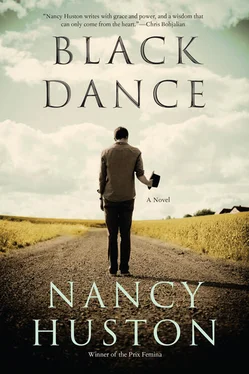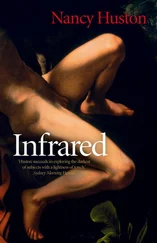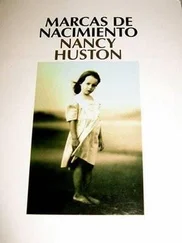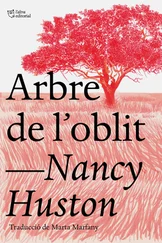“Can a s-l-u-t be r-a-p-e-d ?”
Soft feminine gales of laughter. “God only knows!”
We close our eyes beneath the blindingly bright lights.
Tall trees crash headlong to the ground, crushing bushes and undergrowth. Forest animals bolt away with terror in their eyes. A fire starts, spreads and rises, leaping into the air to meet the sun. Then the sun vanishes and thunderclouds make war upon the fire, hurling their rain-bullets at its ecstatic, dangerously rearing body.
A gigantic grunt of relief issues from our guts and lungs and we hear, severally:
“Ah! Here it comes!” “Here it comes at last!” “It’s a girl!” “It’s a little girl!” “Don’t you want to see your daughter, miss?”
The pink light on the screen moves slowly from left to right and back again: we’re shaking our head no.
Soft, thin pink material, pink cloth, floats and sways in the air, curves and dances until it becomes a butterfly. Moving slowly and gracefully, the pink butterfly approaches the burning forest. Its wings evaporate in the scorching heat before the flames touch them. Its narrow dark body bakes to a crisp, freezes with the extreme heat, then crumbles into ash like a cone of incense.
The baby is gone. A male voice suddenly resonates above the women’s: the obstetrician has arrived.
“You should have done an episiotomy, she’s all torn up. What did she have?”
“A girl.”
“Normal?”
“Oh, yes, Doctor. Everything’s A-OK.”
“All right. I’ll go fill out the adoption forms, then.”
A swinging door goes thuck as he passes through it.
“A-OK, Doctor,” one of the nurses whispers sarcastically. “Apart from the fact that it’s an Injun bastard, of course. .”
The others huff with laughter.
“Shall I sew her up, or shall you?”
“You go ahead. I’ll make you a cup of tea for the nausea afterward. Deal?”
“Deal. . Maybe I should just sew it up completely so she’d stop corrupting our poor vulnerable men. Eh, Sister Anne? What do you think? Maybe we should just sew up the whole yawning mess?”
“Now, now, Sister Claire. Don’t forget, sinning in word is as bad as sinning in deed.”
Back to the sweltering shadows of Awinita’s mind.
Terrified kittens hunching in withdrawal, puffed-up with hostility, their saucer-eyes sizzling with resentment.
Finally the stitching is done and we sink gratefully into oblivion. .
DOES THE GIRL get a name, Milo? No, not in our film. There she is, barely born and we’re gonna have to push her out of the story. Let’s at least take a good look at her before she disappears.
Hey. . you doing all right? We can stop talking for a while if you like. I could even come back tomorrow. . Okay, no sweat. I’ll stay. Must be weird, to say the least, to think you have a half sister walking around somewhere on the planet and you’ll never know who she is, where she is or what kind of life she lived. .
Hang in there, Astuto. This is no time to give up. The Good Lord will be coming by with your daily tritherapy a mere few hours from now.
• • • • •
A place or house of worship: terreiro de candomblé. More generally, any location or site.
Milo, 1962–65
SUNDAY MORNING MASS in the tiny village church we’ve seen before. Now ten, Milo is seated in the third row next to his best friend, a boy named Normand. Heftier and quite a bit older than Milo, Normand has clearly been kept back in school a number of times. (A motley crowd, your crowd of friends, Astuto. All your life long, nothing but misfits and artists and outcasts, fat girls and queers.)
Bored, the two boys are playing with fire and the name of that fire is laughter. They pass the Sunday service schedule back and forth, each trying to make the other snicker with his doodles in the margin. Normand’s drawing shows a plumply pregnant young woman being peed on by a boy, and bears the title Hail Mary, what a disgrace . Milo manages to choke down his amusement. Now it’s his turn; he bends his head and scribbles. A moment later he hands his friend a drawing of apples, pears and cherries tumbling from between a woman’s legs, captioned Blessed be the fruit of thy womb . Normand snorts, causing heads to swivel.
Jean-Joseph Dubé leans over from the pew behind them. In a matter of seconds, he has lifted the program from Normand’s hand, looked at it, and passed it back to their teacher. Glancing at the paper in turn, Mrs. Morisette lets out a low cry of shock. As the congregation rises for the next hymn, she squeezes past everyone in her pew, strides up the aisle, grabs the two boys by the hair (though Normand is taller than she), and marches them back to the middle pews where the parents are seated.
Close-up on Milo’s face, shutting down.
CUT to the farmhouse kitchen: Marie-Thérèse screaming at him as she whips him on the back with Régis’s leather shaving strop:
“How dare you embarrass me like that in front of everybody! Stupid little pagan! Whore-son! Evil seed! I’ll scrub your soul clean if it’s the last thing I do on this earth!”
Beyond the windows in the backyard, using a saw as a guitar and an empty oil barrel as a drum, François-Joseph and Jean-Joseph are mock yodeling Roger Miron’s country-western hit at the tops of their lungs:
À qui le p’tit cœur après neuf heures?
Est-ce à moi, rien qu’à moi?
Quand je suis parti loin de toi, chérie
À qui le p’tit cœur après neuf heures? 1
CUT to the sky. A piercing sapphire-blue summer sky on a hot day. Crows flap across it, cawing blackly. Ominous, shimmering heat. The camera swoops down to a clump of poplar trees in a corner of the property, where Milo is sitting hunched on a tree stump.
We approach him gently from behind, then swing round to find his hands busy whittling.
A few seconds later, the statuette is completed. Though less than three inches high, it is expressive: two deer’s legs topped by a twofaced human head, one of the faces grimacing in fury, the other in fear. Milo holds it up and blows on it, scattering wood chips. Kneels at the foot of a tree, digs a hole in the ground with his penknife and deftly slips the statuette into it. Fills in the hole, pats down the dirt, smooths over the surface, pulls the grasses together above it until there is no trace of a disturbance. The Dubé property is being given an invisible but potent underground population: scattered here, there and everywhere, dozens of these figurines are in the ground already. They are Milo’s allies. Like his, their lives unfold in the darkness. Like him, they have to learn to find their freedom there.
Sound track: organ music. .
CUT TO NEIL’S library, a Sunday morning in January. Afflicted with a head cold, Milo has been allowed to miss Mass. Neil has settled him onto his lap and is reading out loud to him from Oscar Wilde’s The Importance of Being Earnest . Milo reads along, exulting in the correspondence between the written and spoken words. Suddenly we see him laugh. The music fades.
“Is it not a marvel?” says Neil, gently covering the child’s small hand with his large, age-speckled one. “That this Irishman, Oscar Fingal O’Flahertie Wills, by himself rebaptized Wilde, born on the far side of the Atlantic Ocean in 1854, can make a Canadian boy laugh a hundred years later?”
“A hundred and eight,” says Milo.
“Wha?. . Yes, you’re right, a hundred and eight. And this is only the beginning, Milo. These shelves contain countless treasures. I’ll introduce them to you one by one. My library will be your school away from school and your church away from church. We must just keep it a secret from Marie-Thérèse; that’s not a problem, is it?” (Milo shakes his head.) “Books from all centuries and continents. Poems, tragedies, comedies, histories, war and adventure, nonsense and fairy tales. . All of humanity’s multitudinous joys and sorrows at your fingertips, my boy! Some of these volumes are worth a pretty penny. Look at this one, Milo. . and this one. . In my youth, the greatest writers of Ireland were my friends. James Joyce and William Butler Yeats. .”
Читать дальше












